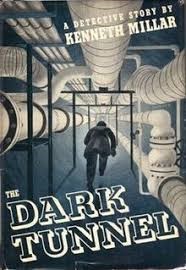THE DARK TUNNEL Spoiler Alert

Do You Know What Time it is?
One of the charms of reading Macdonald’s mature fiction is its timelessness. He deliberately chose not to use any slang that would go out of style. Present-day readers will note the absence of cell phones and the internet, but they may not realize the books may very well have been written before they were born. The Dark Tunnel and Trouble Follows Me are both clearly period pieces, not only in their choice of subject matter, but in some of the attitudes they express.
As Mike Duncan observed in his podcast Revolutions, during the French Revolution it was possible to go from revolutionary to radical to moderate to conservative to reactionary without ever changing your opinions. And not just during the French Revolution.
I recently had an education in the shelf life of social attitudes in fiction. In 1990 I wrote a mystery, The January Corpse, that included a long speech where a trans woman explains herself. At the time the book was considered edgy and my agent told me it was unfilmable. The book achieved a certain popularity in the gay community because of its positive presentation of a trans character.
In 2000, I set down to review the books I published between 1990 and 1996 and I reread that speech. By the time I had read the first paragraph I knew it had to be rewritten for the new Amazon edition. What sounded in 1990 as a ringing defense of her right to transition now read like a guilty apology.
Macdonald’s presentation of homosexuality and cross-dressing is value-laden, to say the least. He identifies cross-dressing entirely as a homosexual activity, and his moral disapproval of both is evident. He mentions that in the early days, the Nazi party had a number of homosexual leaders, and there are a number of attempts to associate homosexuality with Nazism, the most obvious one being the relationship Peter Esch and Carl Schneider. Perhaps Macdonald can be forgiven for not appreciating in 1943 the savage persecution of homosexuals under the Nazis; but whether you accept the excuse or not, his treatment of the subject reads badly today. As Wolfe notes, “keeping the issue of homosexuality before us without dramatizing or explaining, only makes sense as crude commercialism.”
Summing Up The Dark Tunnel
“A novel is a prose narrative of some length that has something wrong with it.”
–Randall Jarrell
This is not just a witticism, I have an essay by Annie Dillard on my wall next to my desk,” Write Till You Drop,” where she takes the point further:
“Every book has an intrinsic impossibility, which its writer discovers as soon as his first enthusiasm dwindles. The problem is structural, it is insoluble; it is why no one can ever write this book . . .. He writes it in spite of that. He finds ways to minimize the difficulty; he strengthens other virtues; he cantilevers the narrative out into thin air and it holds.”
As a writer of mystery novels myself, I tend to be both harder and easier on my fellow-practitioners. Although I am quick to find flaws, I have an inherent respect for the sheer brute difficulty of the work.
There is much wrong with the book, but it has important strengths:
- Right out of the starting gate, Macdonald demonstrates a sense of plotting, pace and structure that will rarely desert him
- With the exception of Branch, he creates vivid, diversified characters and he understands how to move the minor characters aside when they’ve performed their function
- He shows that he is a man with a social conscience as well as a moral center; every Ross Macdonald novel will be a struggle about the nature of the good and never simply a whodunnit
Could it have been better? Oh, yes.
- As mentioned above, the core of the book is Peter Esch’s successful impersonation of his own sister Ruth; the story as written is riddled with implausibilities that at least could have been minimized
- There is nothing wrong with Branch as a character that the deletion of about a hundred lines of dialogue could not have cured
- The ambiguous nature of good and evil would eventually come to be Macdonald’s primary subject. If Macdonald had chosen this story at the height of his powers, he would have found a way to address the terrible dilemma of Herman Schneider, forced to betray his adopted country in the service of a cause he detested. In The Dark Tunnel it is an aside; a mature Macdonald would have wrestled with Doctor Schneider’s story.
The Dark Tunnel is not the skillful piece of work touted by the critic for The New York Times. But it is a promising start.
Any comments? Email me at dgarrett1948@ptd.net
Recent Comments